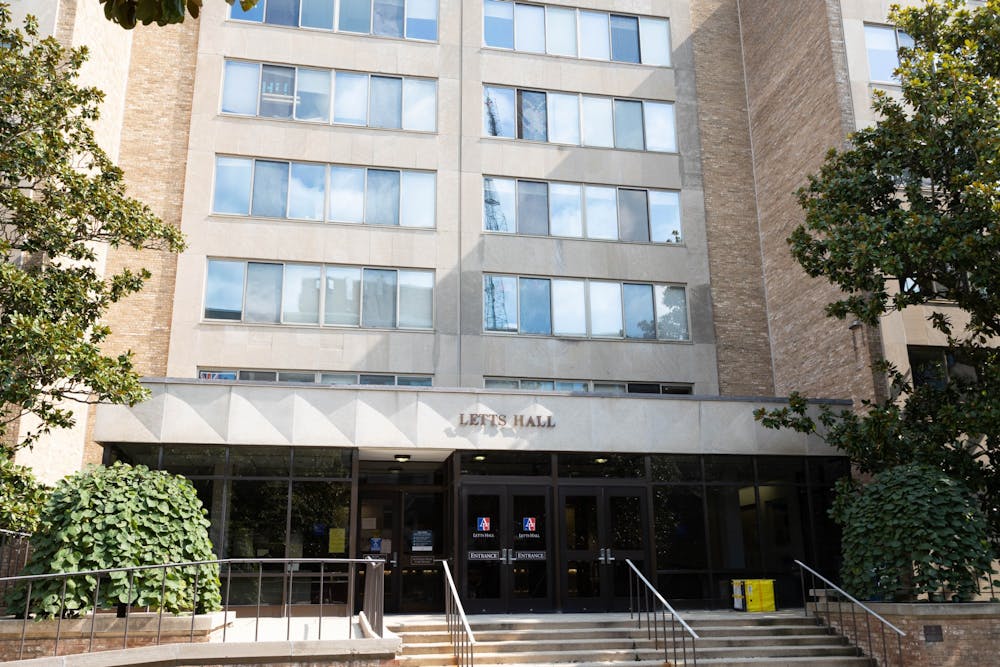American University will not be offering isolation housing for students living on campus infected with COVID-19, the University announced in an email to students on June 30.
During the 2021-2022 academic year, the University provided separate hotel rooms for isolation, reserved for on-campus students who tested positive for COVID-19. For the fall 2022 semester, AU will no longer be providing these services, instead recommending students who live on campus and test positive for COVID-19 to isolate in their own rooms.
Students who live off campus were expected to isolate in place during the 2021-2022 academic year, a policy that will continue into the fall 2022 semester.
University spokespersons Elizabeth Deal and Jasmine Pelaez said the University is following the CDC’s updated guidelines and the practices of other universities.
“Our updates reflect these same guidelines and students living on campus must self-isolate immediately in the same manner that anyone living off campus would in their personal residence,” Deal said in an email to The Eagle.
Some universities such as Georgetown University and George Washington University have also stopped providing isolation housing in favor of isolating in place. Others in the area, like Howard University and George Mason University, will continue to provide separate isolation rooms for students living on campus in the case they test positive.
This year, a Communicable Diseases Addendum was added to the 2022-2023 On-Campus Housing Agreement that all students living on campus must sign, pictures of which were obtained by The Eagle.
“By voluntarily agreeing to reside in on-campus housing, I agree that I may be subject to certain risks to my health resulting from Communicable Diseases, including that the University will not provide isolation housing or amenities for isolating in place beyond standard services provided by the Student Health Center for care and testing services made generally available to the University community,” the addendum said.
The addendum also has an assumption of risk clause which states that, “[by signing] I acknowledge that, by residing in on-campus housing, I may be exposed to risks that result in my illness, personal injury or death… I understand and agree that the University shall not be responsible for any expenses or damages associated with any illness, personal injury or death that may occur and waive any and all liability resulting therefrom.”
While the University does not require students to live in campus housing, most underclassmen and some upperclassmen elect to and are therefore legally bound by this agreement. AU currently has the capacity to house 67 percent of its full time undergraduate population on campus, according to the University’s 2021 Campus Plan.
If a student living on campus receives a positive COVID-19 test result, they are to immediately isolate themselves in their room and submit a self-report form. Throughout the isolation period, the student should be contacted by the AU COVID Student Support Team.
On either day six or day 11 of their isolation period, they should receive an email from the Student Support Team to release them. If the student is up to date with all COVID-19 vaccinations and booster shots, then they will be released on day 6, as long as they do not have symptoms. They will not be required to take an antigen test, but they will have to wear a mask in public spaces for five days after being released. If a student is not vaccinated, they will be released on day 11.
Students who test positive are urged to inform their professors of their COVID-19-related absences. After submitting a positive test result, students will receive a letter from the Office of the Dean of Students to share with faculty and advisors.
The University has certain recommendations for student living while isolating. For example, isolating students can receive meals by ordering delivery through GrubHub or by pre-ordering food from the AU Kitchen. Students can leave their rooms for short periods of time to complete necessary tasks such as picking up meals and packages, laundry, medical treatment, further testing, emergency evacuations and to use the restrooms and showers.
A KN95 mask or equivalent model must be worn by the student at all times when outside of their room and inside of their room if it is a shared space.
In response to a questions about students using communal bathrooms and showers, the University directed The Eagle to the Covid Guide for Residential Students, which says that students with COVID-19 are permitted to leave their rooms to access restrooms.
Roommates of students who have tested positive for COVID-19 will not be told to isolate but are encouraged to wear a mask and might be asked to get tested. Roommates will not be permitted a separate room during the isolation period.
AU did not answer The Eagle’s question as to whether immunocompromised or otherwise high risk students will be able to receive accommodations for a separate room assignment in order to reduce transmission risk if their roommate tests positive.
In regards to monkeypox, the University has not yet determined what isolation procedures will be.
“We are in the process of determining the isolation protocol for Monkeypox, which has different health parameters than COVID-19,” Pelaez said. “We are working with DC Health and other universities on this matter.”
The University will continue to implement mitigation measures against COVID-19, Pelaez said, including providing free PCR tests via vending machines around campus, requiring proof of vaccination and wearing masks in classrooms.
“It is our hope to reach a point where masks can also be optional in the classroom and we will evaluate this protocol regularly,” Pelaez said.
jyoung@theeagleonline.com, ibrown@theeagleonline.com
Correction: A previous version of this article said that AU did not answer The Eagle's questions about procedures for students living in dorms with communal bathrooms and showers. This article has been updated to include the University's response to The Eagle's question about communal bathrooms and showers.





